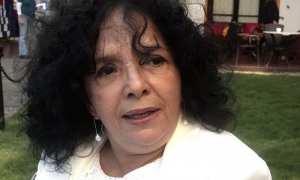
When Juanamaria Cordones Cook received this week from Luis Morlote, president of Union of Cuban Artists and Writers (UNEAC), the Dulce Maria Loynaz International Award, granted by the organization at the proposal of its Writers Association and the Jose Antonio Aponte Commission, the Uruguayan professor, essayist and documentary filmmaker, based in the United States, reviewed how in the last 30 years of her life Cuban culture has been a constant passion and permanent commitment.
It all began the day she met poet Nancy Morejón, who was attending an academic meeting at the University of Missouri, where Juanamaría teaches. Until then, she had focused her interest on black theatrical practices in Uruguay, her country of origin. Through Nancy," she confessed, "I discovered the work of many contemporary black and mulatto Cuban artists, writers and intellectuals and learned how, after 1959, for most of them, possibilities for training, development and promotion opened up, something that isnot abundant in other countries in the region.
It was precisely Nancy who delivered the eulogy of Juanamaria in an evening attended by the Vice Minister of Culture, Fernando Rojas, and crowned by the emotional interpretation of the piece La ruta del esclavo, by its author, Gerardo Alfonso, protagonist of one of the most recent audiovisual productions of the honoree.
The impressive testimonial saga, which includes more than 30 documentaries, records the life and poetic work of Georgina Herrera and Nancy Morejón, playwright Eugenio Hernández Espinosa, visual artists Eduardo “Choco” Roca, Alberto Lescay, Manuel Mendive, Belkis Ayón, Santiago Rodríguez Olazábal, Rolando Estévez and Roberto Diago, and the work of Rogelio Martínez Furé, Víctor Fowler, Yana Elsa Brugal and Zuleica Romay in researching the African legacy on the island.
"Afro-Latin American cultural creation, in which Cuba has a notable weight, she said, has its origin in the colonization that exploited African slave labor. From there later came: suffering, creativity, the emancipating vocation."
Translated by ESTI






